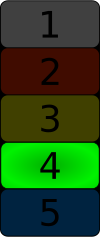|
| 14 August 2024 |
|
Hello, welcome to my userpage. I contribute mainly to the English and Irish Wikipedias. Feel free to leave a comment on my talk page.
Recently I have started to play an active role in cleaning up vandalism here on Wikipedia. On 30 September I even managed to revert six unconstructive edits in one minute!
If you need any help, leave a message on my talk page. Be warned though, I wouldn't consider myself an absolute genius, but I'll be able to help you with the basics. FF3000 · talk
- Contact Me
- Me on other Wikipedias
- Vicipéid (Irish language Wikipedia)
- German Wikipedia
- Me on Wikimedia's other Projects
- Me at work
- Other links
| Wikipedia:Babel | ||||
|---|---|---|---|---|
| ||||
| Search user languages |
Marie Curie (1867–1934) was a Polish and naturalised-French physicist and chemist who conducted pioneering research on radioactivity. Born in Warsaw, she studied in Poland until she was 24, when she moved to Paris to earn her higher degrees. In 1895, she married French physicist Pierre Curie, and in 1903 she shared the Nobel Prize in Physics with Pierre and physicist Henri Becquerel for their pioneering work developing the theory of "radioactivity" – a term she coined. She was the first woman to win a Nobel Prize. She won a second Nobel Prize in 1911, the first person to do so, for her discovery of the elements polonium and radium. Under her direction, the world's first studies were conducted into the treatment of neoplasms by the use of radioactive isotopes. During World War I, she developed mobile radiography units to provide X-ray services to field hospitals. She founded the Curie Institute in Paris in 1920, and the Curie Institute in Warsaw in 1932. This photograph of Curie was taken in around 1920 by French photographer Henri Manuel.Photograph credit: Henri Manuel; restored by FMSky and Bammesk
 | |
| Wikipedia ads | file info – show another – #252 |
Wikipedia vandalism information
(abuse log)

Low to moderate level of vandalism
[view • purge • update]
3.52 RPM according to EnterpriseyBot 15:10, 21 August 2024 (UTC)
| This is a Wikipedia user page. This is not an encyclopedia article or the talk page for an encyclopedia article. If you find this page on any site other than Wikipedia, you are viewing a mirror site. Be aware that the page may be outdated and that the user in whose space this page is located may have no personal affiliation with any site other than Wikipedia. The original page is located at https://en.wikipedia.org/wiki/User:Footyfanatic3000/olduserpage. |













